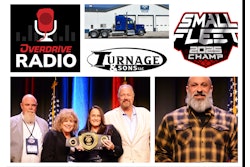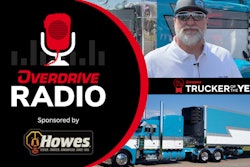Off the top of the Overdrive Radio podcast this week is the voice of fuel-payments provider Wex's Vice President of Global Anti-Financial Crimes William Fitzgerald laying out a 1 in 12,000 transaction rate for detection of fraud over the company's entire fuel-payments network. That is, 1 in every 12,000 purchases are flagged as suspicious, potentially fraudulent, and blocked in automated fashion among its millions upon millions of fuel transactions facilitated annually.
Translate that incidence to the roughly 350,000 fuel transactions National Association of Small Trucking Companies President David Owen knows move through the association’s own Quality Plus Network fuel program any given month, and that’s right at 30 transactions held up by the system monthly, or a few hundred a year. Fitzgerald was speaking at NASTC's annual conference, outline the evolving landscape of fuel fraud/theft for attendees and showcasing tools within Wex's networks that are increasingly successful in helping carriers of all shapes and sizes eliminate fraud's impact.
Along the way, too, the company's been able to reduce its rate of so-called "false positives" -- incidence of legimate fuel purchases held up by the card provider's systems as potentially fraudulent. Fitzgerald's well aware such hold-ups can be particularly annoying, and unproductive. Illustrating the huge financial impact of stolen fuel, though, he asked this hypothetical question to the room of NASTC conference attendees:

"What would be an acceptable false-positive rate in your minds?" he asked. "How many good transactions would you be OK with me stopping to prevent a bad one?"
The goal is zero false positives, of course, as Wex and other card providers calibrate a variety of techs operating in the background in their networks to get there. Results from ongoing calibration at Wex in particular have been good in recent months, Fitzgerald said. "We've got overall, over the last 10 months, a 25% reduction in losses, a 32% reduction in false positives," and a big increase in detection, too, he said.
[Related: Fuel-payments providers boost theft protection amid card-skimming explosion]
Those results he attributed largely to technical innovations, some described in part in a recent paper about Wex's "closed loop" security system, authored by the company, you'll find at this link, also detailed in the podcast.
 Overdrive Radio's sponsor is Howes, longtime provider of fuel treatments like its Howes Diesel Defender all-weather mileage booster and winter Diesel Treat anti-gel treatments to get you through the coldest temps, the Howes Multipurpose penetrating oil, and other products.
Overdrive Radio's sponsor is Howes, longtime provider of fuel treatments like its Howes Diesel Defender all-weather mileage booster and winter Diesel Treat anti-gel treatments to get you through the coldest temps, the Howes Multipurpose penetrating oil, and other products.
"We've seen the most yield" in fraud prevention, he said, "with education and empowerment."
Fitzgerald described efforts of Wex itself to illustrate the kinds of schemes that might result in infiltration of its own backend, including simulated phishing attacks through targeted fake emails designed to get a user to provide access to their login data. Wex sends such emails to its own employees on occasion to lure them in, thus serving an educational purpose in awareness. Their most "successful" such effort?
A fake offer of "free Taylor Swift tickets," Fitzgerald said. "Everybody clicked on that."
Sometimes, phishing fakes are extremely hard to resist.
In the podcast, track through Fitzgerald's entire NASTC talk, through those backend upgrades on to plenty more you can do to work with the company's team and tools in its system, like its SecureFuel solution, to prevent fuel theft. Likewise, should the worst happen, to work with law enforcement to apprehend the thieves. Take a listen:
[Related: 'Personal cyber hygiene' in our age of social engineering hacks]
[Related: ELD data-engagement: Your insurance premium could depend on it]










